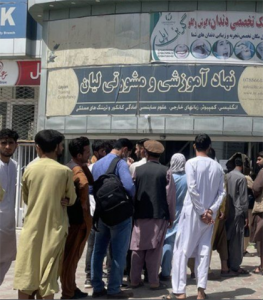Afghanistan facing financial and humanitarian crises
Afghanistan is facing financial collapse and a resultant humanitarian crisis following the Taliban takeover on August 15, international aid agencies say.
In the period between the fall of the previous government and the installation of the Taliban’s administration, state employees have not been paid.
 Aid agencies say banks have been closed for weeks, ATMs are out of cash meaning that even Afghans with savings haven’t been able to access money.
Aid agencies say banks have been closed for weeks, ATMs are out of cash meaning that even Afghans with savings haven’t been able to access money.
The Taliban has ordered that foreign remittances be paid in local currency, keeping foreign cash reserves for themselves. But the buying power of the local ‘Afghani’ currency is plummeting as prices rise.
And with Taliban fighters patrolling the streets, many people have decided to stay at home, forcing shops and restaurants to close.
Even before the Taliban took control of the country, about half the population, or 18 million people, depended on humanitarian aid to survive, according to the United Nations.
UN Secretary General António Guterres warned of a humanitarian catastrophe looming in Afghanistan with new levels of economic hardship clearly visible on the streets.
Mr Guterres expressed his “grave concern at the deepening humanitarian and economic crisis in the country,” saying that basic services were under threatened of complete collapse.
“Now more than ever, Afghan children, women and men need the support and solidarity of the international community,” Mr Guterres said in a statement.
“I urge all member states to dig deep for the people of Afghanistan in their darkest hour of need. I urge them to provide timely, flexible and comprehensive funding,” he said.
The UN has launched a flash appeal for Afghanistan for the “most immediate humanitarian needs and funding requirements needed over the next four months”.
Mr Guterres said almost half of the population of Afghanistan, 18 million people, need urgent humanitarian assistance to survive.
“One in three Afghans do not know where their next meal will come from. More than half of all children under five are expected to become acutely malnourished in the next year,” he said.
“People are losing access to basic goods and services every day. A humanitarian catastrophe looms,” Mr Guterres said.
Afghanistan’s fragile economy has been dependent on foreign aid. The World Bank and IMF both halted funding for their projects in the country in response to the Taliban gaining control of the capital.
“We are deeply concerned about the situation in Afghanistan and the impact on the country’s development prospects, especially for women,” the World Bank said in a statement.
The US has also frozen $US9.4 billion in the reserves of the Afghanistan’s central bank.
But cutting Afghanistan off from international economic support could impact ordinary people, rather than the Taliban, agencies say.
And according to the World Bank, foreign economic support covers 75 per cent of public spending.
Advocacy group Human Rights Watch (HRW) says foreign donors should take immediate action to ensure that necessary aid reaches Afghans facing hunger and collapsing health services following the Taliban takeover.
HRW said the donors also need to develop a coordinated plan of action to address support for education, the banking system, and other critical needs that require the cooperation of Taliban authorities, who threaten basic human rights, particularly the rights of women and girls.
“To prevent a dire situation from becoming even worse, donors should urgently agree to support international agencies and nongovernmental groups that can provide emergency aid for food, health, and education, and create a plan to address assistance directly involving the Taliban,” said HRW spokesperson Patricia Grossman.
Meanwhile, UN children’s agency UNICEF, said that of the almost seven million children under age 5 in Afghanistan, an estimated 3.1 million, were acutely malnourished.
UNICEF says the Afghan education system, which currently has seven million children enrolled, will need continued foreign funding.
“Nongovernmental groups have played a crucial role in the education sector but educate only several hundred thousand students outside the state system. Donor governments that have provided funding should press the Taliban to allow all schools to operate, and allow girls and women to attend at all levels, without intimidation,” a UNICEF statement said.












